Hubert Robert Painting Reproductions 1 of 1
1733-1808
French Rococo Painter
Hubert Robert (1733-1808) was a French painter, draftsman, and stage designer who is best known for his depictions of ruins and imaginary landscapes. He was born in Paris, France, and was the son of a master mason. His father encouraged him to pursue architecture, but Robert showed more aptitude for drawing and painting.
In 1754, Robert began his formal art education at the Académie royale de peinture et de sculpture in Paris. He studied under the painter Jean-Baptiste Pigalle and the architect Jacques-François Blondel. While at the academy, he became interested in the work of the Italian painter Giovanni Battista Piranesi, whose prints of ancient ruins and fantastical architecture had a significant influence on Robert's own work.
In 1760, Robert traveled to Rome, where he spent several years studying the ruins of ancient buildings and painting landscapes. He became friends with many of the leading artists and intellectuals of the day, including the French archaeologist and writer Johann Joachim Winckelmann. Robert's time in Italy had a profound impact on his artistic style, and he became known for his depictions of ancient ruins and classical landscapes.
After returning to Paris in 1765, Robert quickly established himself as one of the leading painters of his time. He was appointed as the official painter to the king, and he created many works for the royal palaces and gardens. He also worked as a stage designer for the Paris Opéra, creating sets and backdrops for many of the operas and ballets of the day.
Robert was a member of the Royal Academy of Painting and Sculpture, and he exhibited his work regularly at the academy's annual exhibitions. His work was also exhibited at the prestigious Salon de Paris, where it was well received by critics and the public alike.
During the French Revolution, Robert's fortunes declined. He had been a supporter of the revolution at first, but he soon fell out of favor with the new government. In 1793, he was arrested and imprisoned, but he was released after several months. He continued to paint throughout his life, but his later works were less ambitious than his earlier works.
Hubert Robert died in Paris in 1808, at the age of 74. Today, he is remembered as one of the most important artists of his time, and his works can be found in many of the world's leading art museums, including the Louvre in Paris, the Metropolitan Museum of Art in New York, and the National Gallery of Art in Washington, D.C.
In 1754, Robert began his formal art education at the Académie royale de peinture et de sculpture in Paris. He studied under the painter Jean-Baptiste Pigalle and the architect Jacques-François Blondel. While at the academy, he became interested in the work of the Italian painter Giovanni Battista Piranesi, whose prints of ancient ruins and fantastical architecture had a significant influence on Robert's own work.
In 1760, Robert traveled to Rome, where he spent several years studying the ruins of ancient buildings and painting landscapes. He became friends with many of the leading artists and intellectuals of the day, including the French archaeologist and writer Johann Joachim Winckelmann. Robert's time in Italy had a profound impact on his artistic style, and he became known for his depictions of ancient ruins and classical landscapes.
After returning to Paris in 1765, Robert quickly established himself as one of the leading painters of his time. He was appointed as the official painter to the king, and he created many works for the royal palaces and gardens. He also worked as a stage designer for the Paris Opéra, creating sets and backdrops for many of the operas and ballets of the day.
Robert was a member of the Royal Academy of Painting and Sculpture, and he exhibited his work regularly at the academy's annual exhibitions. His work was also exhibited at the prestigious Salon de Paris, where it was well received by critics and the public alike.
During the French Revolution, Robert's fortunes declined. He had been a supporter of the revolution at first, but he soon fell out of favor with the new government. In 1793, he was arrested and imprisoned, but he was released after several months. He continued to paint throughout his life, but his later works were less ambitious than his earlier works.
Hubert Robert died in Paris in 1808, at the age of 74. Today, he is remembered as one of the most important artists of his time, and his works can be found in many of the world's leading art museums, including the Louvre in Paris, the Metropolitan Museum of Art in New York, and the National Gallery of Art in Washington, D.C.
5 Hubert Robert Paintings
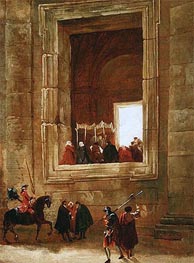
The Vatican, Rome n.d.
Oil Painting
$853
$853
SKU: RHU-11668
Hubert Robert
Original Size: unknown
Private Collection
Hubert Robert
Original Size: unknown
Private Collection
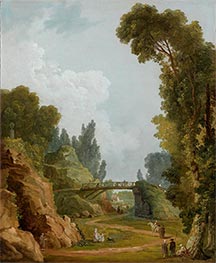
The Rustic Bridge, Chateau de Mereville, France c.1785
Oil Painting
$971
$971
Canvas Print
$62.88
$62.88
SKU: RHU-17603
Hubert Robert
Original Size: 65.4 x 53.3 cm
Minneapolis Institute of Arts, Minnesota, USA
Hubert Robert
Original Size: 65.4 x 53.3 cm
Minneapolis Institute of Arts, Minnesota, USA
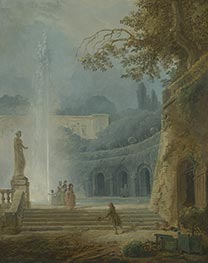
The Fountain c.1775/78
Oil Painting
$1388
$1388
Canvas Print
$60.65
$60.65
SKU: RHU-17696
Hubert Robert
Original Size: 113 x 90.2 cm
Kimbell Art Museum, Fort Worth, USA
Hubert Robert
Original Size: 113 x 90.2 cm
Kimbell Art Museum, Fort Worth, USA
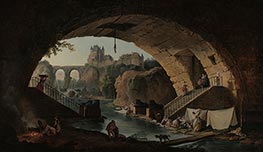
View of Bridge of Sphinx 1767
Oil Painting
$1803
$1803
Canvas Print
$50.59
$50.59
SKU: RHU-19001
Hubert Robert
Original Size: 96 x 163 cm
Fuji Art Museum, Tokyo, Japan
Hubert Robert
Original Size: 96 x 163 cm
Fuji Art Museum, Tokyo, Japan
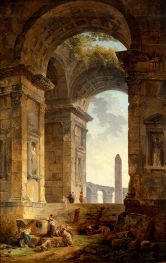
Ruins with an Obelisk in the Distance 1775
Oil Painting
$1639
$1639
Canvas Print
$50.59
$50.59
SKU: RHU-19594
Hubert Robert
Original Size: 160 x 104 cm
Pushkin Museum of Fine Arts, Moscow, Russia
Hubert Robert
Original Size: 160 x 104 cm
Pushkin Museum of Fine Arts, Moscow, Russia